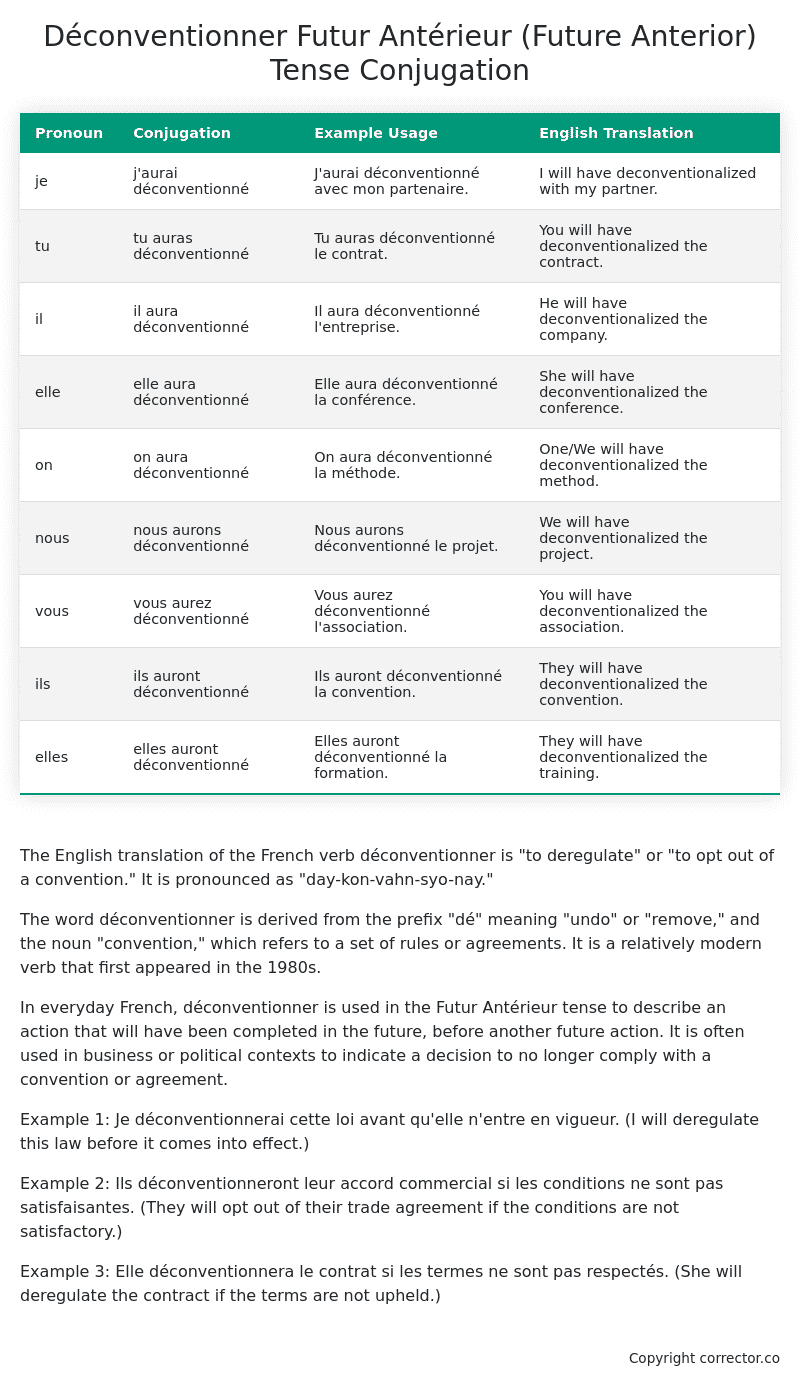Futur Antérieur (Future Anterior) Tense Conjugation of the French Verb déconventionner
Introduction to the verb déconventionner
The English translation of the French verb déconventionner is “to deregulate” or “to opt out of a convention.” It is pronounced as “day-kon-vahn-syo-nay.”
The word déconventionner is derived from the prefix “dé” meaning “undo” or “remove,” and the noun “convention,” which refers to a set of rules or agreements. It is a relatively modern verb that first appeared in the 1980s.
In everyday French, déconventionner is used in the Futur Antérieur tense to describe an action that will have been completed in the future, before another future action. It is often used in business or political contexts to indicate a decision to no longer comply with a convention or agreement.
Example 1:
Je déconventionnerai cette loi avant qu’elle n’entre en vigueur.
(I will deregulate this law before it comes into effect.)
Example 2:
Ils déconventionneront leur accord commercial si les conditions ne sont pas satisfaisantes.
(They will opt out of their trade agreement if the conditions are not satisfactory.)
Example 3:
Elle déconventionnera le contrat si les termes ne sont pas respectés.
(She will deregulate the contract if the terms are not upheld.)
Table of the Futur Antérieur (Future Anterior) Tense Conjugation of déconventionner
| Pronoun | Conjugation | Example Usage | English Translation |
|---|---|---|---|
| je | j’aurai déconventionné | J’aurai déconventionné avec mon partenaire. | I will have deconventionalized with my partner. |
| tu | tu auras déconventionné | Tu auras déconventionné le contrat. | You will have deconventionalized the contract. |
| il | il aura déconventionné | Il aura déconventionné l’entreprise. | He will have deconventionalized the company. |
| elle | elle aura déconventionné | Elle aura déconventionné la conférence. | She will have deconventionalized the conference. |
| on | on aura déconventionné | On aura déconventionné la méthode. | One/We will have deconventionalized the method. |
| nous | nous aurons déconventionné | Nous aurons déconventionné le projet. | We will have deconventionalized the project. |
| vous | vous aurez déconventionné | Vous aurez déconventionné l’association. | You will have deconventionalized the association. |
| ils | ils auront déconventionné | Ils auront déconventionné la convention. | They will have deconventionalized the convention. |
| elles | elles auront déconventionné | Elles auront déconventionné la formation. | They will have deconventionalized the training. |
Other Conjugations for Déconventionner.
Le Present (Present Tense) Conjugation of the French Verb déconventionner
Imparfait (Imperfect) Tense Conjugation of the French Verb déconventionner
Passé Simple (Simple Past) Tense Conjugation of the French Verb déconventionner
Passé Composé (Present Perfect) Tense Conjugation of the French Verb déconventionner
Futur Simple (Simple Future) Tense Conjugation of the French Verb déconventionner
Futur Proche (Near Future) Tense Conjugation of the French Verb déconventionner
Plus-que-parfait (Pluperfect) Tense Conjugation of the French Verb déconventionner
Passé Antérieur (Past Anterior) Tense Conjugation of the French Verb déconventionner
Futur Antérieur (Future Anterior) Tense Conjugation of the French Verb déconventionner (this article)
Subjonctif Présent (Subjunctive Present) Tense Conjugation of the French Verb déconventionner
Subjonctif Passé (Subjunctive Past) Tense Conjugation of the French Verb déconventionner
Subjonctif Imparfait (Subjunctive Imperfect) Tense Conjugation of the French Verb déconventionner
Conditionnel Présent (Conditional Present) Tense Conjugation of the French Verb déconventionner
Conditionnel Passé (Conditional Past) Tense Conjugation of the French Verb déconventionner
L’impératif Présent (Imperative Present) Tense Conjugation of the French Verb déconventionner
L’infinitif Présent (Infinitive Present) Tense Conjugation of the French Verb déconventionner
Struggling with French verbs or the language in general? Why not use our free French Grammar Checker – no registration required!
Get a FREE Download Study Sheet of this Conjugation 🔥
Simply right click the image below, click “save image” and get your free reference for the déconventionner Futur Antérieur tense conjugation!

Déconventionner – About the French Futur Antérieur (Future Anterior) Tense
Construction
Common Everyday Usage Patterns
Interactions with Other Tenses
For example
Summary
I hope you enjoyed this article on the verb déconventionner. Still in a learning mood? Check out another TOTALLY random French verb conjugation!


